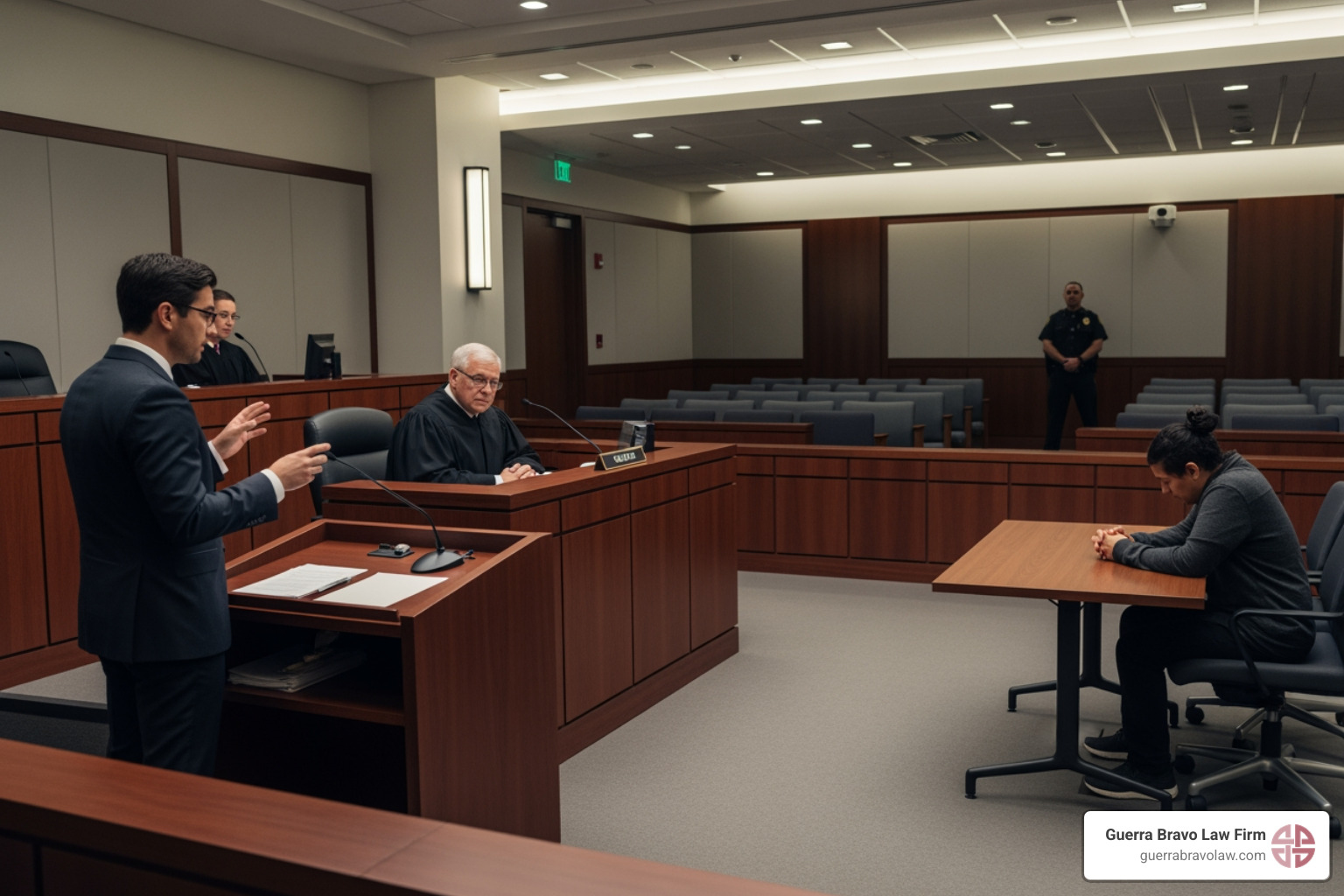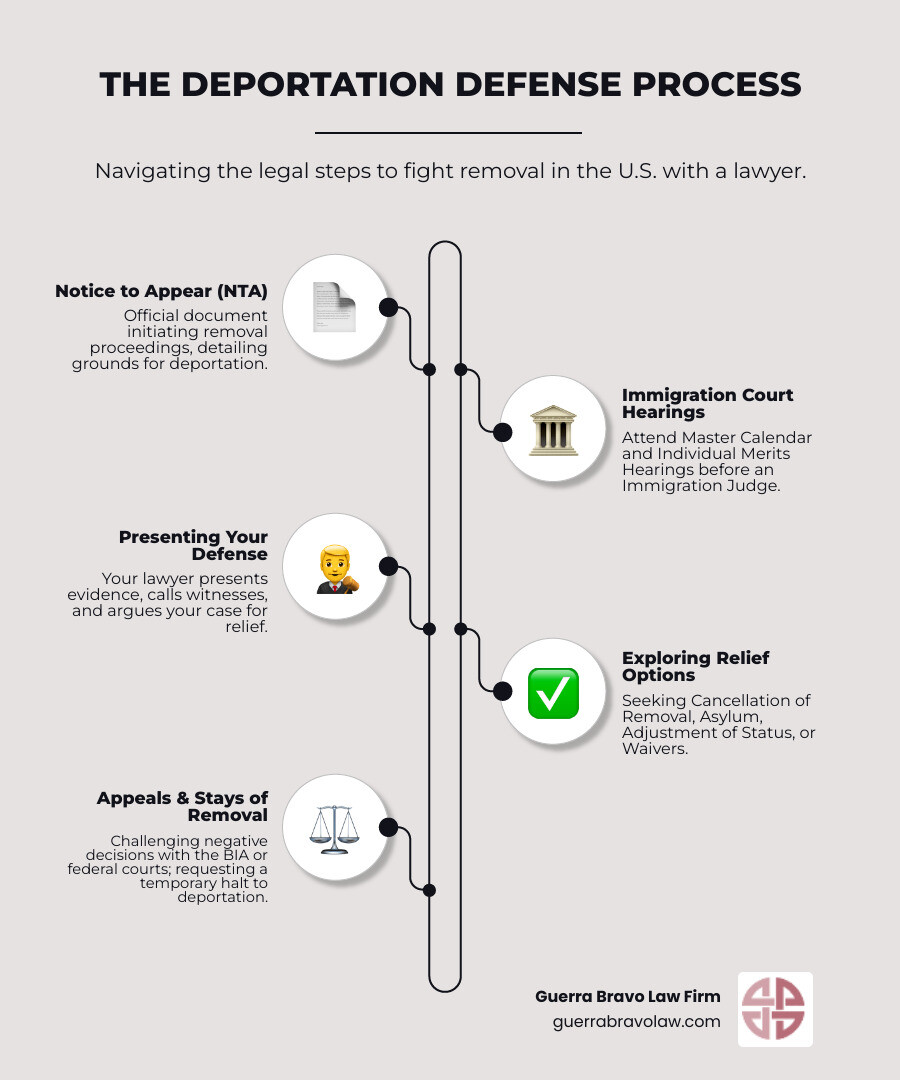
Navigating Removal: Your Lawyer's Role in Stopping Deportation
Why Understanding Your Rights During Deportation is Critical
Can a lawyer stop deportation? Yes. An experienced immigration attorney can use multiple legal strategies to halt removal proceedings, including:
Cancellation of Removal - Allows you to remain in the U.S. and obtain a green card
Asylum and Withholding of Removal - Protection if you fear persecution in your home country
Adjustment of Status - Apply for a green card through a U.S. citizen family member
Waivers - Forgive certain criminal convictions or immigration violations
Stay of Removal - Temporarily halt deportation while pursuing other legal options
Appeals - Challenge negative immigration judge decisions
Facing deportation is a terrifying experience. The fear of being separated from family and losing the life you've built is overwhelming. However, deportation is not always the final outcome. The U.S. immigration system provides multiple legal pathways to stop removal—if you know they exist and how to use them.
This is where a skilled deportation defense lawyer becomes essential. They don't just fill out forms; they analyze your entire immigration history, identify every possible defense, and represent you in court against trained government attorneys. In immigration court, timing is everything, and missing a single deadline can mean losing your only chance to fight.
The legal landscape is complex, with strict eligibility requirements and procedural rules. Thousands of cases are denied each year that might have succeeded with proper legal representation. An attorney ensures you steer this complexity effectively.

Understanding the Deportation Process: From Notice to Removal
Before you can stop deportation, you must understand the process. It's a series of legal steps, each offering an opportunity to defend yourself. Knowing what to expect is your first line of defense.
Everything begins with the Notice to Appear (NTA). This official document starts your removal proceedings. The NTA lists the government's reasons for seeking your deportation, including the charges against you and your first court hearing date. Your lawyer will scrutinize this document, as even a small error can sometimes be grounds to terminate your case.
Your case is heard by an Immigration Judge (IJ) in a specialized administrative court managed by the Executive Office for Immigration Review (EOIR).
The first court appearance is the Master Calendar Hearing. This is a preliminary hearing where you will admit or deny the charges in the NTA and inform the court which forms of relief from deportation you plan to seek. Your lawyer will speak on your behalf and the judge will set a date for your trial.
Your trial is the Individual Merits Hearing. This is your chance to present your full case. Your attorney will submit evidence, call witnesses, and make legal arguments for why you should be allowed to stay. The government will present its case, and your lawyer will challenge their evidence and cross-examine their witnesses.
Throughout this process, Immigration and Customs Enforcement (ICE) acts as the prosecutor. An ICE attorney argues for your deportation. ICE is also responsible for detaining individuals and carrying out removal orders.
Crucially, failing to appear at any court hearing is devastating. A judge can order you deported "in absentia" (in your absence), making it exponentially harder to fight your case. You could also face an arrest warrant and be barred from most forms of relief for 10 years. If you need help with detention issues, you can find more information about ICE detention release here.
At every stage, you have rights. An experienced attorney knows how to steer each step, identify weaknesses in the government's case, and build the strongest possible defense for you.
So, Can a Lawyer Stop Deportation? The Power of Legal Defense
Can a lawyer stop deportation? Yes, absolutely. While no attorney can guarantee an outcome, skilled legal representation dramatically increases your chances of success. The government has trained attorneys working to remove you; you should have someone equally skilled fighting for you to stay.
A deportation defense attorney does more than fill out forms. They build a comprehensive legal strategy to protect your future in the U.S. Here’s how they make a difference:
Developing a Custom Strategy: Your lawyer analyzes your entire immigration history, family ties, and other factors to identify the strongest defenses. Cookie-cutter approaches fail in immigration court.
Challenging the Government's Case: They scrutinize every detail of the government's evidence. Is the Notice to Appear defective? Are there procedural errors? An experienced lawyer can file motions to terminate proceedings when the government makes mistakes.
Building Your Defense with Evidence: Your attorney knows exactly what evidence judges need to see. For a Cancellation of Removal case, this might mean medical records, financial documents, and community support letters. For asylum, it could be country condition reports and expert testimony. A lawyer ensures nothing is overlooked.
Representing You in Court: Your attorney is your voice and shield at every hearing. They make legal arguments, cross-examine witnesses, and protect your rights. A persuasive presentation to a busy judge can make all the difference.
Appealing a Negative Decision: If the judge rules against you, your lawyer can file an appeal with the Board of Immigration Appeals (BIA) and request a stay of removal to prevent deportation while the appeal is pending.
Applying for Relief from Deportation
Critically, you may qualify for legal relief and not even know it. An attorney's most important role is identifying which forms of relief you are eligible for and proving it to the court. The immigration system offers numerous ways to stop deportation, but all have strict requirements.
Preparing these applications is complex. A single mistake on a form or a missing document can lead to denial. Many forms of relief require proving "extreme hardship" to a qualifying family member—a subjective legal standard. Your attorney knows how to gather psychological evaluations, medical evidence, and expert testimony to build a compelling hardship case.
Most relief also requires demonstrating good moral character. Your lawyer will help gather evidence of your positive contributions, such as letters of support, proof of volunteer work, and tax returns.
Deportation defense is not a do-it-yourself project. The stakes are too high and the law is too complex. With the right lawyer, you have a fighting chance to stay in the country you call home.
Key Legal Avenues to Stop Deportation in the U.S.
There isn't one "magic bullet" to stop deportation. Instead, the U.S. immigration system offers multiple legal pathways, and an attorney's job is to find the right fit for your unique case. Your defense is shaped by your immigration history, family ties, time in the U.S., and other factors.

Family-Based and Residency-Based Defenses
These defenses recognize the deep ties you have to the United States.
Cancellation of Removal is a powerful defense that cancels your deportation and grants you a green card. There are two versions:
For lawful permanent residents (green card holders), you must have held your green card for at least five years, lived in the U.S. continuously for seven years, and not have been convicted of an aggravated felony. More info about Green Card Deportation.
For those without a green card, you must prove 10 years of continuous physical presence, good moral character, and that your removal would cause "exceptional and extremely unusual hardship" to a U.S. citizen or permanent resident spouse, parent, or child. This high standard requires showing hardship significantly beyond the normal pain of separation, such as a relative's serious medical condition. With only 4,000 of these applications approved nationwide each year, expert legal help is essential.
Adjustment of Status allows you to apply for a green card in court if you have an immediate U.S. citizen relative (spouse, parent, or child over 21) who can petition for you.
Humanitarian Relief: Asylum, Withholding, and Victim-Based Visas
If you face danger in your home country, the U.S. offers several forms of protection.
Asylum is for individuals who fear persecution in their home country based on race, religion, nationality, political opinion, or membership in a particular social group. You must generally apply within one year of arriving in the U.S.
Withholding of Removal and Convention Against Torture (CAT) protection are alternatives if you are ineligible for asylum. The standard of proof is higher, but if you meet it, the judge must grant protection, preventing your deportation to a country where you would likely be persecuted or tortured. These do not provide a path to a green card but keep you safe. Read more on Deportation as Torture.
U Visas and T Visas offer protection for victims of crime and human trafficking. The U Visa is for victims of certain serious crimes who assist law enforcement, while the T Visa is for trafficking victims. Both provide temporary legal status and a path to a green card.
Waivers and Discretionary Options
These tools ask the government to forgive a legal barrier, like a criminal conviction or unlawful presence.
Waivers of Inadmissibility can forgive certain grounds of deportability. The 212(h) waiver, for example, may forgive certain criminal offenses if your removal would cause extreme hardship to a qualifying relative. More info about what crimes are eligible for deportation.
Prosecutorial Discretion is when your attorney persuades the ICE lawyer to dismiss or administratively close your case based on positive factors like long-term residence and strong family ties.
Voluntary Departure allows you to leave the U.S. on your own terms, avoiding a formal deportation order and the 10-year bar on returning that comes with it. This can be a smart strategic choice if you may qualify for a visa in the future.
DACA provides protection from deportation and work authorization for eligible individuals who came to the U.S. as children. While new applications are not being accepted due to legal challenges, current DACA recipients can continue to renew their status.
The Critical Role of Timing and Appeals in Deportation Cases
In immigration law, deadlines are absolute. Missing one can permanently close the door on your best defense. An experienced deportation defense attorney knows these timelines and acts quickly to preserve all your legal options.

Acting Quickly: Why Every Second Counts
From the moment you receive a Notice to Appear, the clock is ticking.
The one-year asylum deadline is unforgiving. You must generally file your application within one year of arriving in the U.S. Losing this option due to a missed deadline is a common and tragic mistake.
You have just 30 days to file an appeal with the Board of Immigration Appeals (BIA) after a negative decision. If day 31 arrives and your appeal isn't filed, you lose your right to challenge the ruling.
Building a winning case takes time. Gathering the necessary psychological evaluations, medical records, and support letters for a strong defense can take months. Starting early is not just less stressful—it's critical to your case.
The Appeals Process: Challenging a Negative Decision
If the immigration judge orders you removed, the fight isn't over. The appellate system provides more opportunities to challenge the decision.
Your attorney can file a legal brief with the Board of Immigration Appeals (BIA), arguing that the judge made a legal or factual error. The BIA can reverse the decision or send your case back for a new hearing.
If the BIA denies your appeal, the next step may be the U.S. Circuit Court of Appeals. This is a complex federal court process that provides another chance to challenge your removal order.
Throughout this process, your lawyer can file a motion for a stay of removal. This is a court order that temporarily stops ICE from deporting you while your appeal is pending. Without a stay, ICE could remove you even while your case is being decided, making it nearly impossible to win. Seeking Stays of Removal is a critical tool for protecting you while you continue to fight.
Finally, if new evidence comes to light, your lawyer can file a motion to reopen your case, asking the judge or BIA to take another look based on new developments.
Frequently Asked Questions about Stopping Deportation
Understanding your situation is the first step toward building a defense. Here are honest answers to some of the most common questions we hear.
Can marriage to a U.S. citizen automatically stop my deportation?
No, marriage to a U.S. citizen does not automatically stop deportation. However, it is a powerful factor that may make you eligible to apply for a green card through Adjustment of Status, even while in removal proceedings. Your lawyer must prove to the judge that your marriage is legitimate and that you meet all other eligibility requirements. The process can be complex, and waivers may be needed to overcome prior immigration violations, so careful legal guidance is essential.
What happens if I have a criminal record?
A criminal record seriously complicates a deportation case, but it does not always make it impossible to win. An experienced Removal Defense Lawyer will analyze your specific conviction to determine if it legally qualifies as a deportable offense. Not all crimes carry the same immigration consequences.
While certain convictions can make you ineligible for most forms of relief, it may be possible to apply for a waiver to forgive the crime, such as a 212(h) waiver. To qualify, you typically need to demonstrate extreme hardship to a U.S. citizen or permanent resident spouse, parent, or child. Don't assume your case is over; have an attorney review the details.
I have a U.S.-born child. Will that prevent my deportation?
Having a U.S.-born child, by itself, does not prevent deportation. We know how devastating separation would be, but the law sets a very high bar.
The hardship your U.S. citizen child would suffer is the central element of a Cancellation of Removal case. You must prove that your removal would cause "exceptional and extremely unusual hardship" to your child. This is a much higher standard than the normal difficulties of separation.
To meet this standard, your lawyer must present compelling evidence of suffering that is significantly greater than what other children in similar situations would face. This could include a child's serious medical condition, special educational needs, or severe psychological trauma. A lawyer is critical to gathering the psychological evaluations, medical records, and expert testimony needed to build a winning case.
Your Best Defense is an Experienced Attorney
So, can a lawyer stop deportation? The answer is a resounding yes. But when your future in America is on the line, you need an advocate who truly understands both sides of the courtroom. Facing the government's trained attorneys alone is a risk no one should take. An experienced deportation defense attorney can identify your best legal strategy, protect you from procedural mistakes, and build the strongest possible case for you to remain in the United States.
At Guerra Bravo Law Firm, our legal team brings something unique to the table: over 14 years of insider experience working for ICE and DHS. We know exactly how the government builds its cases because we used to build them ourselves. We understand their strategies and vulnerabilities, allowing us to counter their arguments effectively.
We serve the communities of McAllen, Brownsville, and across the Rio Grande Valley, providing dedicated and individualized legal strategies. Every case is different, and we treat yours with the attention it deserves. Whether you're facing removal due to a criminal conviction or an expired visa, we fight for you like family.
If you or a loved one is facing removal in Texas, do not wait. Every day matters.
Take the first step toward protecting your future. Contact our removal defense team today for a consultation.


